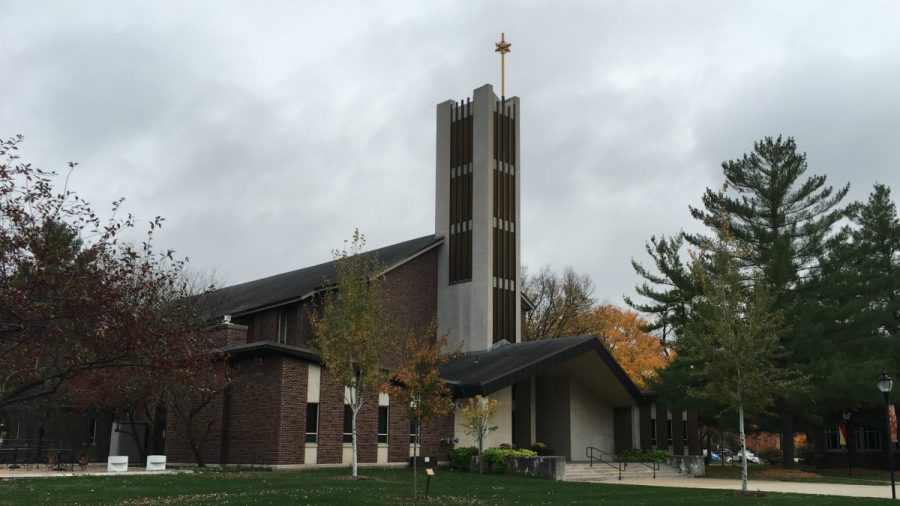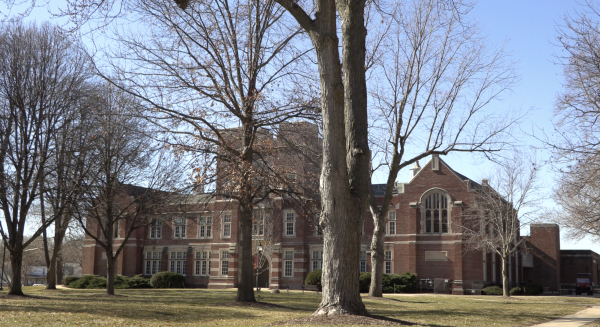RLC chastises ‘anti-Muslim rhetoric’ amid Trump’s travel ban
“We are called to welcome the stranger; we are called to love,” says RLC president
January 29, 2017
DES MOINES, Iowa — As President Donald Trump sticks to his campaign promises, using executive orders to temporarily ban travel to the United States from seven predominately Muslim nations, Simpson College, too, is remaining steadfast to its commitment of “fostering an inclusive campus community.”
Trump’s travel ban also includes barring refugees from entering the country for four months, though he defended his widely criticized order on Sunday, saying in a statement: “To be clear, this is not a Muslim ban, as the media is falsely reporting. This is not about religion – this is about terror and keeping our country safe.”
The ban, which blocks immigrants from Iran, Iraq, Libya, Somalia, Sudan, Syria and Yemen, has been put on hold after federal judges in New York, Massachusetts, Virginia and Washington state stepped in.
In a statement to The Simpsonian, Jay Simmons, president of Simpson, said: “Last month, I sent a memo to our campus community regarding the Deferred Action for Childhood Arrivals… That commitment applies in this circumstance as well.”
Simmons cited the United Methodist Church’s Book of Discipline, which reads: “Religious persecution has been common in the history of civilization. We urge policies and practices that ensure the right of every religious group to exercise its faith free from legal, political, or economic restrictions.
“We condemn all overt and covert forms of religious intolerance, being especially sensitive to their expression in media stereotyping. We assert the rights of all religions and their adherents to freedom from legal, economic and social discrimination.”
Students who are not U.S. citizens or permanent residents and are registered for a Simpson study abroad experience should contact Jay Wilkinson, director of international education, to discuss international travel plans.
“Simpson College welcomes students regardless of their citizenship status,” Simmons said last month. “As a United Methodist-related college with a mission that values social justice and global citizenship, we remain committed to fostering an inclusive campus community.”
Simmons had signed a petition to support students who are registered with the DACA program or people who entered the United States illegally.
Simmons clarified that the college will not track students’ documentation status and will not release institutional records or information about students without permission, unless responding to a duly issued subpoena, court order or warrant under the Family Educational Rights and Privacy Act.
“Recognizing the changeable nature of the existing immigration regulations, we strongly encourage students who are not U.S. citizens or permanent residents to consider whether they should leave the country,” Simmons said.
Anyone with questions about DACA can contact Kent Eaton, interim senior vice president and academic dean; Tracie Pavon, assistant vice president for enrollment and financial assistance; Walter Lane, assistant dean for multicultural and international affairs; or Luke Behaunek, dean of students.
Andrea Casaretto, a junior studying international relations, religion and French at Simpson, is a Muslim and said Trump’s order is “shameful” and “unjust.”
“It goes against our Constitution, as far as I can tell,” Casaretto wrote in an editorial. “If it were a ban on Asians, a ban on Jews, or anyone else, my opinion wouldn’t change; being a Muslim like the people being banned doesn’t make me feel stronger about it.”
“However, as a Muslim, I do feel a fiery passion about fighting against oppression,” she added. “That is part of my faith, and I stand against this ban with my faith in mind.”
Casaretto said she drew an emotional response upon seeing the hashtag #MuslimBan trending on Twitter. She saw a photo of a crowd and a man holding a sign proclaiming that Jews will stand for Muslims.
“I started to just cry because here we are with millions of people trying to escape war just as the Jewish Europeans had to, and they are being rejected. To me ‘Never again’ is a lie anymore,” she wrote. “Rather than helping the meek, we are kicking them down even further. This is not what we are supposed to do!”
The Simpson College Religious Life Community is also taking a stand against what it calls anti-Muslim rhetoric after Trump’s plans were announced this weekend.
“The Simpson College Religious Life Community is exactly that – a community,” said Christopher Hanson, president of RLC, in a statement to The Simpsonian. “And in that community, we have representations from all kinds of faith expressions, but one thing that bonds us all together is love. Regardless of the sacred text being referenced, or even human morals, we are called to welcome the stranger; we are called to love.”
The organization tweeted on Sunday a graphic titled “Do No Harm: A Call to Solidarity with the Muslim Community” in which Hanson said was relevant now more than ever.
The initiative takes a stand in support of Muslims, renouncing racist and xenophobic generalizations and confronting Islamophobia in any form.
“The Religious Life Community believes that we must stand with those who are oppressed, and we must let our voices be heard,” Hanson said. “This poster shows some practical ways to show that kind of support for our Muslim brothers and sisters.”
According to the poster, here are four tips you can use if you witness Islamophobic harassment:
1. Engage conversation
Go to them, sit beside them and say hello. Try to appear calm, collected and welcoming. Ignore the attacker.
2. Pick a random subject and start discussing it
It can be anything: a movie you liked, the weather, saying you like something they wear and asking where they got it.
3. Keep building the safe space
Keep eye contact with them and don’t acknowledge the attacker’s presence: the absence of response from you two will push them to leave the area shortly.
4. Continue the conversation until the attacker leaves and escort them to a safe place if necessary
Bring them to a neutral area where they can recollect themselves; respect their wishes if they tell you they’re OK and just want to go.
We support the Muslim community & stand against Islamophobic rhetoric. #CallToSolidarity pic.twitter.com/qZBrkB90jQ
— Simpson RLC (@simpRLC) January 29, 2017





















